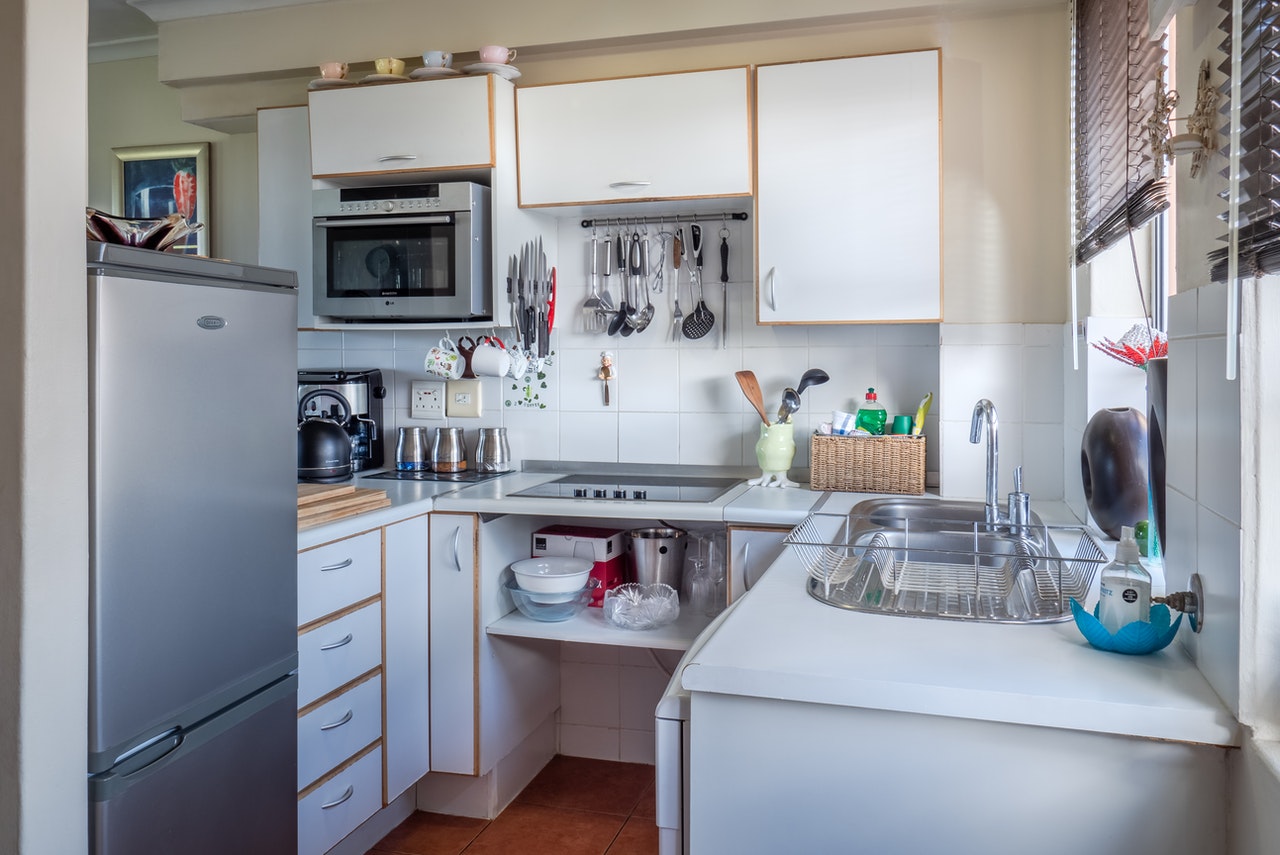 According to the Center for Disease Control and Prevention, about 48 million people get sick due to foodborne diseases in the US alone.
According to the Center for Disease Control and Prevention, about 48 million people get sick due to foodborne diseases in the US alone.
What causes foodborne illness?
In case you are unaware, your kitchen can be a breeding ground for bacteria and viruses. Hence, it is imperative to maintain kitchen hygiene.
Here are nine ways to do it:
Contents
Free Up Your Kitchen Counter
This may not be a popular cleaning tip, but keeping your kitchen counter clutter-free is just as important.
For one, it gives you more room to prep your ingredients. And once you are done, it is easier to wipe your counters clean.
It does not mean that you should empty your counter. However, it would be best to declutter your kitchen so you can move freely and cook with ease.
Just like with any decluttering project, you can donate or sell some of your kitchen items. If the item is something that you do not often use, consider tucking them away in your cupboard.
Keep Your Kitchen Clean
Of course, the first step to keeping your kitchen safe and clean is to keep them clean.
One way to do that is to put all the waste in a good quality waste bin with a lid. This is to prevent your garbage from attracting pests and vermin into your house.
Also, the people at Planet Maids’ Maid Service NYC recommends that you clean your kitchen regularly. This includes wiping your kitchen counters, cabinets, and shelves.
Pay attention to areas where molds are likely to grow, like the corners of your pantry. Lastly, use anti-microbial mats that are meant for the kitchen floor.
Pay Attention to Your Sink
You may have read about it anywhere, but your best kitchen sink can be a breeding ground for disease-causing bacteria. Your sink alone is home to more than 17,000 bacteria per square inch. And to think that you prep and cook in this germ-laden area of your kitchen!
That said, you should make it a habit to clean your kitchen sink thoroughly.
You can wash the sink and eliminate bacteria with hot, soapy water. To ensure that it is well disinfected, you can mix one tablespoon of bleach per quart of water and use it to wipe your kitchen clean.
Prevent Cross-Contamination
One of the primary reasons for food poisoning is cross-contamination. It usually happens during food preparation, when you unknowingly pass on disease-causing bacteria from one food to another.
To prevent that from happening, it is crucial to separate different kinds of food. For instance, do not put raw meat in the same container as your fruits and vegetables.
Another way to prevent cross-contamination is to wash your ingredients before prep, store, or cook them. You should not forget to wash your hands after handling raw ingredients.
Cook Your Food Properly
As previously mentioned, raw ingredients can be contaminated with disease-causing bacteria. So, other than washing them, it is also imperative that you cook your ingredients thoroughly.
When cooking vegetables, the rule of thumb is to wait for them to have a shimmer. But if it is a root vegetable or a tuber, like a potato or a pumpkin, wait for it to get soft enough that you can poke a fork through it.
As for meat and fish, the key is to poke a knife in the meaty part, and you should not see any pinkish part.
If you have any leftovers, make sure that it is reheated throughout. This is to ensure that there are no germs present in your food.
Store Your Food Properly
If you are the kind who cooks your food in bulk and stores some of them, so you do not have to cook every time, then you should know proper food storage techniques.
For one, you should refrigerate your prepped meals properly. Some would even suggest that you freeze your meals. This is to prevent the growth of bacteria that can spoil your food.
And once you bring your freezer meal out, ensure that you consume it within two hours. That’s because germs can grow fast in temperature.
Replace or Disinfect Your Sponge
In case you do not know it, your kitchen sponge can be a breeding ground for germs and bacteria. Thus, you should always replace it every two weeks.
But if you want to live a zero-waste life, you can buy a natural dish scrubber and disinfect it regularly.
To do that, put the sponge into a pot boiling water and cover it with a lid for five minutes. Once done, turn off the heat and take the sponge out using a pair of tongs. Let it cool before wringing out the excess water.
Maintain Personal Hygiene
To keep your kitchen clean and safe, it is vital to maintain personal hygiene. After all, keeping yourself clean is not expensive.
What you can do is clip your fingernails regularly and wash your hands regularly. More so after handling the trash or using the toilet.
Chefs also advise that you wash your hands after handling poultry or meat. This is to reduce the risk of contracting Salmonella or E. coli and cross-contamination.
Add Kitchen Cleaning to Your Schedule
Another best way to maintain the cleanliness of your kitchen is to add it to your schedule.
You can write it on your to-do list or use a calendar reminder. There are also cleaning apps to help organize your household chores. But if you feel like you are pressed for time to clean, consider hiring a professional home cleaner.
The thing is, keeping your kitchen clean and safe does not take rocket science. It is just a matter of staying organized and ensuring that you have personal hygiene.
